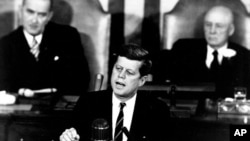Newly released recordings reveal many of President John F. Kennedy’s private conversations and meetings during the final months of his administration.
The John F. Kennedy Presidential Library and Museum in Boston on Tuesday declassified the final 45 hours of White House audio recordings the president secretly taped.
The tapes include meetings with then Russian Foreign Minister Andrei Gromyko, discussions on the conflict in Vietnam, Oval Office visits from the president’s two young children, and discussions about his schedule for the week after he was killed.
The tapes end just two days before the president was assassinated in Dallas on November 22, 1963. In a conversation with an advisor, he discusses a day he could meet with an Indonesian general. Kennedy describes Monday, which eventually was the day of his funeral, as “a tough day.”
“I will see him, when is he here? Monday?" [Answer: "Monday and Tuesday"]. "Well, that’s a tough day." [Response: "It’s a hell of a day Mr. President. He’ll be coming back here though, I understand, on Friday because I offered to entertain at dinner"].
In the background of a recorded meeting with Soviet Foreign Minister Andrei Gromyko, you can hear the president's young children, Caroline, then five years old, and two-year-old John, playing. The children stop into the meeting and Kennedy explains to them that Gromyko’s boss, the Soviet Premier Nikita Khrushchev, is the one that gave the family a dog, Pushinka.
“You can just open the door there - Just have you say hello to my daughter and son. Come in a minute and say hello. Want to say hello to the minister? Do you want to say hello to John?”... “His chief is the one who sent you Pushinka.”
In the tapes made mostly in the Cabinet room or the Oval Office, the Russian diplomat tells the president that U.S. relations with the Soviet Union did not offer “much of a fresh look.” Kennedy had a more optimistic response on the Cold War relationship, saying they had made progress.
“I don’t want you to be discouraged. … There is only a certain tempo which you can move in these matters. We’ve gone ahead with the test ban, we’ve made some progress which for the United States is rather - do you realize that in the summer of 1961, the Congress unanimously passed resolutions against trade with the Soviets and now we’re going ahead, we hope, with this very large trade arrangement that represents what’s changed in American policy of some proportions. That’s progress.”
In the tapes released by the Boston library, Kennedy appears frustrated that his military and diplomatic advisors on Vietnam deliver two different viewpoints on the ongoing war, asking if they visited the same country.
“I mean how is that you get such different - this is not a new thing, this is what we’ve been dealing with for three weeks. On the one hand you get the military saying the war is going better and on the other hand you get the political [opinion] with its deterioration is affecting the military … What is the reason for the difference - I’d like to have an explanation what the reason is for the difference.”
Kennedy also discusses his re-election campaign plans, asking his advisors “what do we have to sell” to young voters to garner their support. He also talks about creating the films for the 1964 Democratic Convention in color rather than black and white. The U.S. and U.S.S.R. race to the moon is also discussed.
In all, Kennedy recorded over 248 hours of meetings and telephone conversations during nearly three years in the White House, keeping them secret from even some of his closest aids. Historians say they were not made in any apparent pattern.
Presidential Recordings Shed Light on Final Kennedy Days











